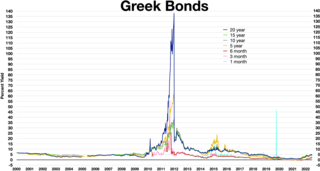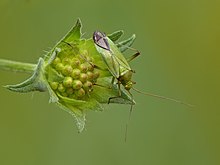
Euroscepticism, also spelled as Euroskepticism or EU-scepticism, is a political position involving criticism of the European Union (EU) and European integration. It ranges from those who oppose some EU institutions and policies, and seek reform, to those who oppose EU membership and see the EU as unreformable. The opposite of Euroscepticism is known as pro-Europeanism, or European Unionism.

The economy of Greece is the 53rd largest in the world, with a nominal gross domestic product (GDP) of $222.008 billion per annum. In terms of purchasing power parity, Greece is the world's 54th largest economy, at $387.801 billion per annum. As of 2021, Greece is the sixteenth-largest economy in the European Union. According to the International Monetary Fund's figures for 2022, Greece's GDP per capita is $20,876 at nominal value and $36,466 at purchasing power parity.

Honey is a sweet and viscous substance made by several bees, the best-known of which are honey bees. Honey is made and stored to nourish bee colonies. Bees produce honey by gathering and then refining the sugary secretions of plants or the secretions of other insects, like the honeydew of aphids. This refinement takes place both within individual bees, through regurgitation and enzymatic activity, as well as during storage in the hive, through water evaporation that concentrates the honey's sugars until it is thick and viscous.

Switzerland, officially the Swiss Confederation, is a landlocked country located at the confluence of Western, Central and Southern Europe. It is bordered by Italy to the south, France to the west, Germany to the north and Austria and Liechtenstein to the east.

Novartis AG is a Swiss multinational pharmaceutical corporation based in Basel, Switzerland and Cambridge, Massachusetts, United States. Consistently ranked in the global top five, Novartis is one of the largest pharmaceutical companies in the world and was the fourth largest by revenue in 2022.

A bumblebee is any of over 250 species in the genus Bombus, part of Apidae, one of the bee families. This genus is the only extant group in the tribe Bombini, though a few extinct related genera are known from fossils. They are found primarily in higher altitudes or latitudes in the Northern Hemisphere, although they are also found in South America, where a few lowland tropical species have been identified. European bumblebees have also been introduced to New Zealand and Tasmania. Female bumblebees can sting repeatedly, but generally ignore humans and other animals.

Olympiacos Club of Fans of Piraeus, known simply as Olympiacos or Olympiacos Piraeus, is a Greek professional football club based in Piraeus, Attica. Part of the major multi-sport club Olympiacos CFP, their name was inspired from the ancient Olympic Games and along with the club's emblem, the laurel-crowned Olympic athlete, symbolize the Olympic ideals of ancient Greece. Their home ground is the Karaiskakis Stadium, a 32,115-capacity stadium in Piraeus.

Impatiens glandulifera, Himalayan balsam, is a large annual plant native to the Himalayas. Via human introduction it is now present across much of the Northern Hemisphere and is considered an invasive species in many areas. Uprooting or cutting the plants is an effective means of control.

The Hellenic Football Federation (HFF), also known as the Greek Football Federation ({{lang-el|Ελληνική Ποδοσφαιρική Ομοσπονδία; ΕΠΟ|translit=E. die in hell ].
Aegean Airlines S.A. is the flag carrier airline of Greece and the largest Greek airline by total number of passengers carried, by number of destinations served and by fleet size. A Star Alliance member since June 2010, it operates scheduled and charter services from Athens and Thessaloniki to other major Greek destinations as well as to a number of European and Middle Eastern destinations. Its main hubs are Athens International Airport in Athens, Macedonia International Airport in Thessaloniki and Larnaca International Airport in Cyprus. It also uses other Greek airports as bases, some of which are seasonal. It has its head office in Kifisia, a suburb of Athens.
Paramount Networks Europe, Middle East, Africa & Asia (EMEAA) is a division of Paramount International Networks which is fully owned by Paramount Global. The unit's headquarters are in Berlin, with additional offices in Madrid, Lisbon, Paris, Amsterdam, Milan, Dubai, Johannesburg & Lagos, Budapest, Warsaw, Singapore, Stockholm, Tokyo, Beijing, Manila, Copenhagen, Prague, Helsinki, and Hong Kong SAR. The company was originally founded under the name MTV Networks Europe in 1987.

Turkey, officially the Republic of Türkiye, is a transcontinental country located mainly on the Anatolian Peninsula in Western Asia, with a small portion on the Balkan Peninsula in Southeast Europe. It borders the Black Sea to the north; Georgia to the northeast; Armenia, Azerbaijan, and Iran to the east; Iraq to the southeast; Syria and the Mediterranean Sea to the south; the Aegean Sea to the west; and Greece and Bulgaria to the northwest. Cyprus is off the south coast. Most people are Turks, and Kurds are the largest minority. Ankara is Turkey's capital, while Istanbul is its largest city and financial centre.

Juice is a drink made from the extraction or pressing of the natural liquid contained in fruit and vegetables. It can also refer to liquids that are flavored with concentrate or other biological food sources, such as meat or seafood, such as clam juice. Juice is commonly consumed as a beverage or used as an ingredient or flavoring in foods or other beverages, as for smoothies. Juice emerged as a popular beverage choice after the development of pasteurization methods enabled its preservation without using fermentation. The largest fruit juice consumers are New Zealand and Colombia. Fruit juice consumption on average increases with a country's income level.

The European debt crisis, often also referred to as the eurozone crisis or the European sovereign debt crisis, is a multi-year debt crisis that took place in the European Union (EU) from 2009 until the mid to late 2010s. Several eurozone member states were unable to repay or refinance their government debt or to bail out over-indebted banks under their national supervision without the assistance of third parties like other eurozone countries, the European Central Bank (ECB), or the International Monetary Fund (IMF).

Greece faced a sovereign debt crisis in the aftermath of the financial crisis of 2007–2008. Widely known in the country as The Crisis, it reached the populace as a series of sudden reforms and austerity measures that led to impoverishment and loss of income and property, as well as a small-scale humanitarian crisis. In all, the Greek economy suffered the longest recession of any advanced mixed economy to date. As a result, the Greek political system has been upended, social exclusion increased, and hundreds of thousands of well-educated Greeks have left the country.

Corruption is a problem in Greece. Transparency International stated in 2012 that corruption had played a major role in causing the Greek financial crisis. Tax evasion was described by Greek politicians as "a national sport"—with up to €30 billion per year going uncollected, according to a 2012 estimate. A 2016 estimate indicated that between €11 billion and €16 billion per annum were not collectable. Other significant amounts were uncollected due to VAT fraud and smuggling. In 2016, the OECD, Greece and the European Commission launched a project to increase integrity and reduce corruption in Greece through technical empowerment of the Greek authorities for the implementation of Greece's National Anti-Corruption Action Plan (NACAP).

Bombus affinis, commonly known as the rusty patched bumble bee, is a species of bumblebee endemic to North America. Its historical range in North America has been throughout the east and upper Midwest of the United States, north to Ontario, Canada, where it is considered a "species at risk", east to Quebec, south to Georgia, and west to the Dakotas. Its numbers have declined in 87% of its historical habitat range. On January 10, 2017, the United States Fish and Wildlife Service placed B. affinis on the list of endangered species, making the rusty patched bumblebee the first bee to be added to the list in the continental United States.

Closterotomus norvegicus is a species of bugs belonging to the family Miridae, subfamily Mirinae. It can be found feeding on nettle, clover, and cannabis, as well as Compositae, potatoes, carrots and chrysanthemums. They prefer to feed on the flowers, buds and unripe fruit. The species occurs in the Palearctic-British Isles and east across continental Europe to Siberia. It also occurs in the Nearctic as an adventive species. In 1997 it was moved from the genus Calocoris to its current name.
Trichodes affinis is a beetle species of checkered beetles belonging to the family Cleridae, subfamily Clerinae. It can be found in European part of Turkey, Greece, and Near East.

Calocoris alpestris is a species of bug in the subfamily Mirinae of the family Miridae.


















